Jealous delusion: definition, causes, symptoms, and treatments
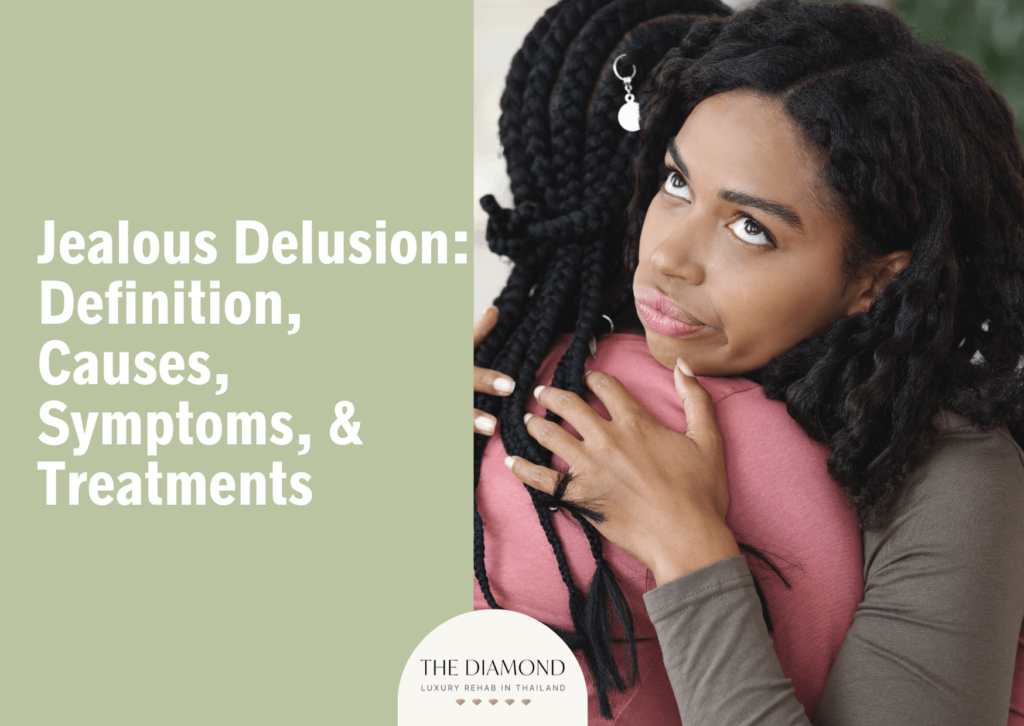
Jealous delusion is a false belief that a partner is being unfaithful despite no evidence to confirm it. People with jealous delusions have a wrong perception of reality. Their jealousy leads to violent behaviors and self-harm. Jealous delusion is often discussed in terms of delusional disorder-jealous type, but it occurs due to several other psychiatric problems as well.
The causes of jealous delusions include delusional disorder, personality disorders, schizophrenia, and anxiety. In addition, genetics, brain abnormalities, and environmental factors contribute to the onset of jealous delusion.
Symptoms of jealous delusions include stalking and other obsessive behaviors, being convinced of someone’s infidelity despite having no evidence, constantly checking and monitoring their partner’s social media, blaming them for problems, and attempting to isolate them from friends and family. The most dangerous symptoms of jealous delusions are violence against a partner, threats, and self-harm.
Treatments for jealous delusions include psychotherapy and medications. The latter is never the sole treatment approach; it’s always used in combination with regular therapy. By adhering to the recommended treatment, the affected persons manage their symptoms, prevent complications, and improve their quality of life.
What is jealous delusion?
Jealous delusion, otherwise known as morbid or delusional jealousy, is a type of delusional disorder characterized by false beliefs that a romantic partner is being unfaithful. Jealousy itself is a complex human emotion that is difficult to define despite its widespread prevalence in interpersonal relationships.
The roots of the word jealousy are Latin and Greek and their meanings relate to fervor, ardor, and love to emulate. However, jealousy is considered a negative emotion in psychology. Jealousy occurs when a person loses or fears losing a valued relationship due to a threat from a real or imagined rival. Not every case of jealousy is delusional. People usually experience emotional or sexual jealousy.
In order to understand jealous delusion, it’s important to know what delusion is, in the first place. Delusion is defined as a false belief that contradicts reality. A person with delusion firmly believes in something even when the reality is different, and there is no reason or evidence, according to a topic titled, “Delusion” last updated in January 2024 by Britannica. Not all delusions are the same; there are several types, including persecutory delusions, erotomanic, grandiose, jealous, and unspecific or mixed delusions.
Delusion itself is not a mental illness, but it is a symptom of a serious psychiatric disorder such as schizophrenia or delusional disorder.
In the case of jealous delusion, the affected individuals are entirely convinced their loved ones are cheating. For that reason, this type of delusion tends to be very destructive as it leads to problems with relationships and even dangerous behaviors as well.
It’s important here to make clarification between obsessive and delusional jealousy. Delusional jealousy is indicated by strong false beliefs that the partner is unfaithful, while obsessive jealousy involves unpleasant and irrational jealous ruminations that a partner is unfaithful. Obsessive jealousy resembles characteristics of obsessive-compulsive disorder (OCD). Both types of jealousy are damaging and potentially dangerous.
Jealous delusion is not a mental illness on its own in terms of being introduced and defined in DSM-5 in that specific way. Diagnostic and Statistical Manual of Mental Disorders, Fifth Edition (DSM-5) by the American Psychiatric Association classifies jealous delusion as a type of delusion that people with delusional disorder have. Delusional disorder is in a chapter called Schizophrenia Spectrum and Other Psychotic Disorders. Jealous delusions occur due to other psychiatric conditions as well.
It’s unknown who was the first person to describe jealous delusion. For centuries, physicians have been trying to uncover more about false beliefs that people had. However, a German-Swiss psychiatrist Karl Jaspers was the first person to define three main criteria that described a delusional belief. In 1913, Jaspers published his observations in a book called General Psychopathology.
That being said, the delusional disorder was first introduced by German psychiatrist Emil Kraepelin back in 1883. The delusional disorder was first introduced in DSM-3-R in 1987, and it continues to be present in all subsequent editions.
How common is jealous delusion?
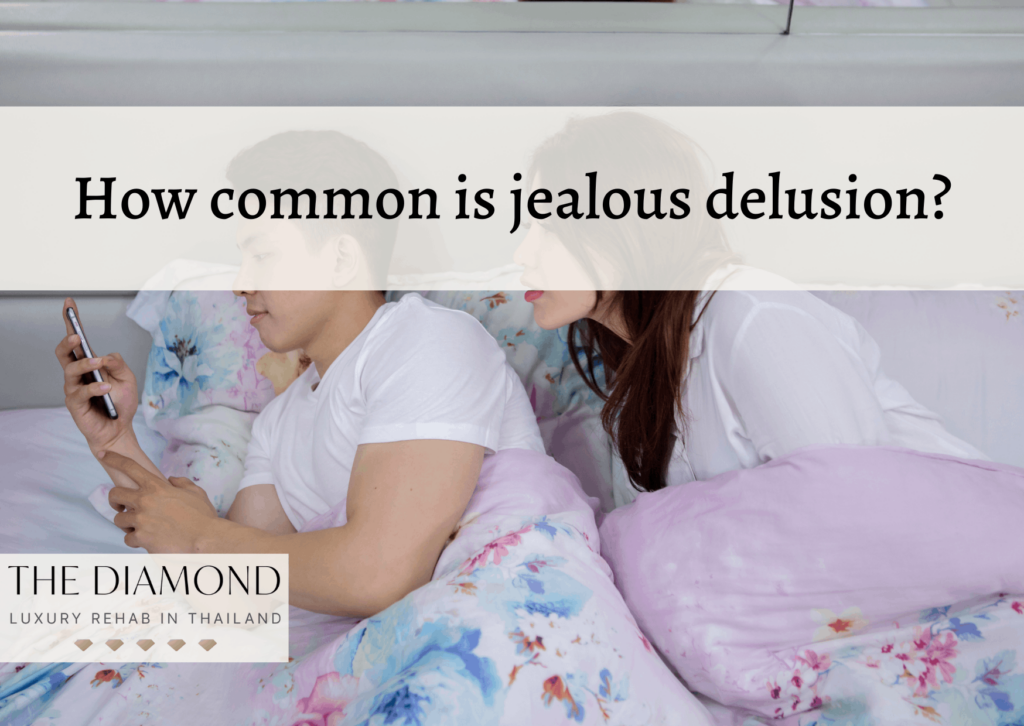
Jealous delusion is an uncommon mental illness, with a reported prevalence of 1.1% in 8,134 psychiatric patients, according to a study titled, “Prevalence of delusional jealousy in different psychiatric disorders. An analysis of 93 cases” published in the British Journal of Psychiatry.
The same study showed that jealous delusions were most common in cases of organic psychosis (7%), paranoid disorders (6.7%), alcohol psychosis (5.6%), and schizophrenia (2.5%).
The above mentioned are figures among psychiatric cases. It is estimated that less than 1% of the global population is diagnosed with delusional disorder-jealous type, according to a 2011 paper by Stephanie Ortigue and Francesco Bianchi-Demicheli published in Medical Science Monitor.
At this point, it’s unclear how many men, women, teens, children, or elderly people have jealous delusions. The prevalence of delusional disorder itself in the general population ranges from 0.05% to 0.1%, according to a report titled, “Delusional disorder” last updated in July 2022 by UpToDate.
The estimated prevalence of delusional disorder in the elderly population is around 0.03%, as reported in a paper by Tampi et al. published in the October 2019 issue of the Therapeutic Advances in Psychopharmacology, but it’s unclear how many children and adolescents have it.
Delusional disorder tends to be more prevalent in women than in men. However, men tend to develop symptoms earlier.
What are the causes of jealous delusion?
The causes of jealous delusion are multifactorial and include a combination of different causes. The main causes of jealous delusions are listed below.
- Delusional disorder: Delusional disorder is a type of mental health condition wherein a person can’t tell what’s real or false and imagined. There are various types of delusional disorder, including delusional jealousy.
- Genetics: Jealous delusions, and conditions that cause them run in families due to genetic variations. Several genes and their variations participate in the development of jealous delusions rather than a single gene. Although genetics is an important cause of jealous delusions, it’s unlikely to be the sole cause. Genetics work in combination with other causes to increase one’s likelihood of developing this problem.
- Brain abnormalities: Biological factors often work in combination with genetics and other causes. Abnormalities in certain areas of the brain contribute to the development of jealous delusions. An imbalance of neurotransmitters does the same. People with delusional disorders show structural and functional changes in brain areas such as the medial frontal/anterior cingulate cortex and the insula. These regions of the brain are involved in emotional expression, mood regulation, and attention allocation. Neurotransmitters involved in the development of jealous delusion include dopamine primarily and glutamate. Their imbalances affect a person’s behaviors and thoughts. Neurodegenerative conditions such as Parkinson’s disease and Huntington’s disease lead to jealous delusion as well.
- Environmental causes: High-stress levels trigger delusions, including the development of a jealous type. Substance use disorders additionally contribute to the onset of jealous delusion, as they act directly on the brain and influence the function of neurotransmitters.
- Schizophrenia: Schizophrenia is a serious mental health disorder characterized by abnormal interpretation of reality. People with schizophrenia tend to have a combination of delusions, hallucinations, and other symptoms, such as disorganized thoughts and behaviors. Jealous delusions result from schizophrenia and they aren’t aware their beliefs are false. A person with schizophrenia refuses to acknowledge their beliefs are incorrect when others try to explain.
- Anxiety disorder: Jealous delusions result from long-term insecurity and low self-esteem and are strongly associated with anxiety disorders. Anxiety produces feelings of intense worry. At the same time, delusions are false beliefs or inaccurate perceptions of real-life situations. For that reason, anxiety creates a fertile ground for the development of jealous delusions in people who are at a high risk of developing it.
- Personality disorders: Personality disorders are mental disorders indicated by rigid and unhealthy patterns of thinking, behaving, and functioning. People with personality disorders struggle to perceive and relate to people and situations. It’s not uncommon for people with mental illnesses such as borderline personality disorder to have delusions. According to an April 2022 paper by K. B. Minarikova et al. in Neuropsychiatric Disease and Treatment, the mechanisms underlying the connection between personality disorders and delusions are unknown. The relationship is likely indirect and involves childhood trauma, but more research is necessary.
What are the symptoms of jealous delusion?
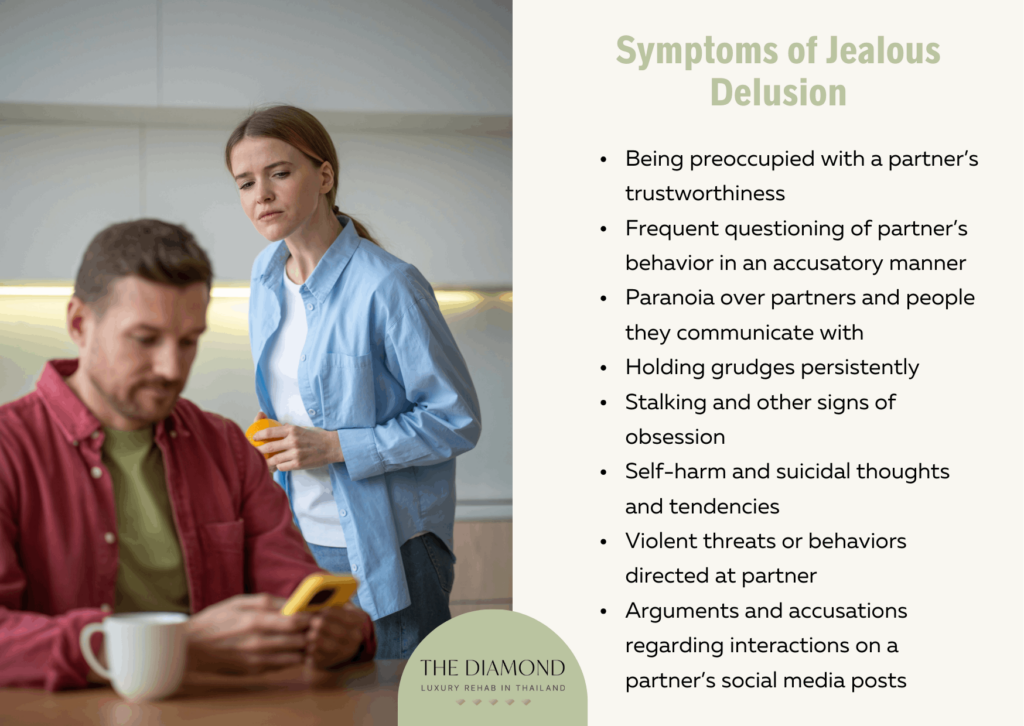
The symptoms of jealous delusion are primarily associated with being convinced of someone’s cheating, which strongly influences a person’s behaviors. When left unmanaged, these symptoms worsen over time and strongly harm a patient’s quality of life. The symptoms of jealous delusion are listed below.
- Being firmly convinced of someone’s cheating even when they have evidence to prove otherwise
- Being preoccupied with a partner’s trustworthiness
- Frequent questioning of partner’s behavior in an accusatory manner
- Hypervigilance (elevated state of constantly evaluating potential threats) such as being constantly on the lookout for signs of bad intent in a partner’s behavior
- Paranoia over partners and people they communicate with
- Banning partners from using social media, constantly checking their profiles, and even taking their phone to check messages
- Holding grudges persistently
- Arguments and accusations regarding interactions on a partner’s social media posts
- Regularly going through partner’s stuff to find evidence of cheating
- Trying to limit the partner’s activities outside the home, monitoring them, and accusing them of cheating when they spend time with friends or participate in activities
- Showing up at work to “surprise” a partner at unusual hours just to confirm they’re indeed there
- Isolating the partner from their family and friends in an attempt to minimize their interactions with everyone else
- Resorting to emotional blackmail just to prevent a partner from “cheating” or to constantly prove how faithful they are
- Constantly blaming the partner for all relationship problems and refusing to admit they’re caused by jealousy
- Stalking and other signs of obsession
- Self-harm and suicidal thoughts and tendencies
- Violent threats or behaviors directed at partner
Who is affected by jealous delusion?
Jealous delusions tend to affect persons in middle to late life, like delusional disorder. Women are more likely to be affected by jealous delusion than men. The average age of onset is around 40 years.
Jealous delusions usually affect people who are socially isolated and at high risk or already diagnosed with a certain psychiatric illness. This type of delusion tends to affect persons with major life stress and an inability to cope properly. One cause of major stress is past infidelity by the current or previous partner.
What are the risk factors for jealous delusion?
The risk factors for jealous delusion are complex and various causes and factors are involved in its development. The most common risk factors for jealous delusion are listed below.
- Personal history of delusional disorder or psychiatric conditions such as schizophrenia, anxiety, personality disorders, depression, etc.
- Family history of mental illnesses
- Alcohol and/or drug abuse
- Spouse working away from home
- Interaction with the opposite sex
- Attractiveness as perceived by the person with delusional jealousy
- Social isolation
- Excessive stress
- Sensitive or narcissistic personality traits
- History of unhealthy relationships
- Low confidence and self-esteem
How is jealous delusion diagnosed?
Jealous delusion is diagnosed after a thorough physical and psychiatric association. There is no specific diagnostic test for jealous delusions, which is why a healthcare provider performs a physical exam first.
They are likely to order a blood test, urine test, and imaging tests such as MRI to determine whether the symptoms result from a physical cause. Blood and urine tests additionally show whether a person is using drugs.
When a physical exam doesn’t show anything specific, a patient undergoes psychiatric evaluation. Generally speaking, psychiatric evaluation is a simple process. It includes answering questions about symptoms, thoughts, and behaviors, and describing delusions or how they make a person feel and act. Patients need to complete a questionnaire. To get a closer insight into a patient’s mental state, a psychiatrist interviews their family members or a romantic partner.
Jealous delusion, in this specific form, is not included in DSM-5 as a separate mental disorder. However, psychiatrists still rely on DSM-5 to determine whether the symptoms meet the diagnostic criteria of mental illnesses such as delusional disorder- jealous type, or other conditions such as schizophrenia.
For example, a patient is diagnosed with delusional disorder-jealous type when they have one or more delusions of at least one month in duration, which isn’t explained by any other condition such as schizophrenia.
In this case, the jealous type of delusional disorder is diagnosed when a person experiences persistent, unrelenting content-specific delusions of a partner’s infidelity that can’t be explained by the conjoint history of drug abuse, physical illness, or schizophrenia.
How to prevent jealous delusion?
There is no specific technique or strategy to prevent jealous delusions. It is possible to prevent complications such as self-harm or harming others. Doing so requires accurate diagnosis and timely treatment. The best thing for a person to do to protect oneself and other people is to adhere to treatment, which is beneficial in improving their quality of life.
Reducing the risk of jealous delusions is possible by managing stress in a healthy manner. Moreover, it is necessary to work actively on managing other mental illnesses, such as schizophrenia, depression, and anxiety.
A healthy lifestyle is crucial for mental health and well-being. Healthy lifestyle habits, such as a well-balanced diet and exercise, exhibit favorable effects on the brain and make it more resilient.
Mindfulness is helpful as well, and there are many strategies to become mindful, including meditation. Keep in mind that these strategies won’t prevent jealous delusions in a way they never happen, but they are helpful in lowering the condition’s risk and reducing its intensity.
What are the treatments for jealous delusion?
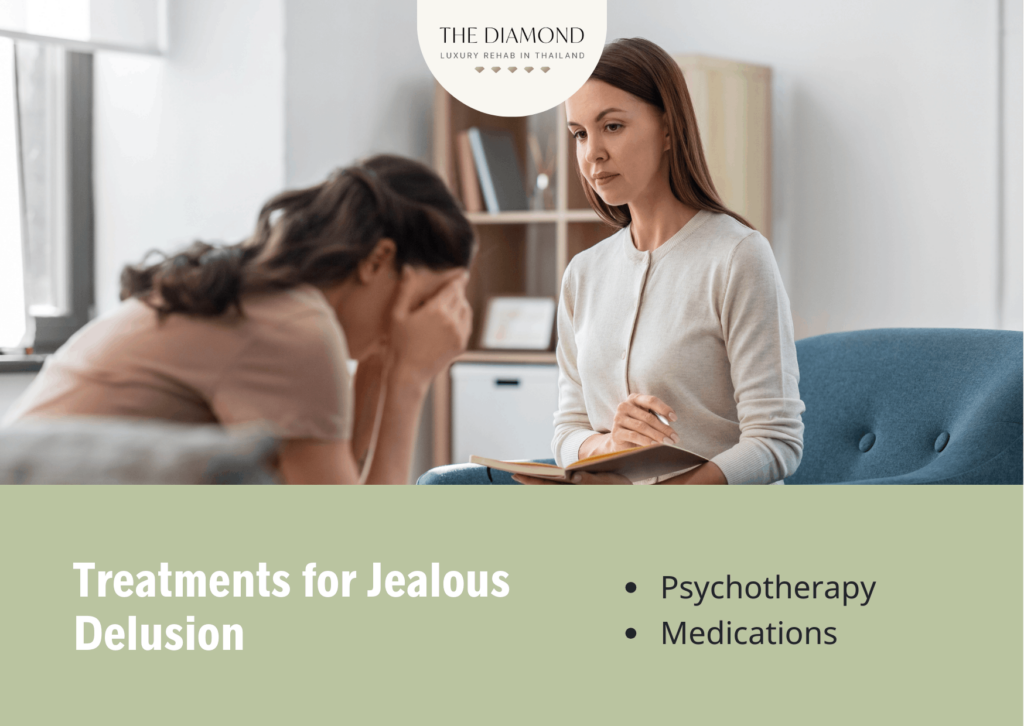
Treatments for jealous delusion depend on the underlying cause. The treatments for jealous delusion are listed below.
- Psychotherapy: Psychotherapy is the first-line treatment for delusional disorders. The main objective of psychotherapy is to encourage patients and help them learn to identify troubling thoughts, emotions, and behaviors in order to change them. With therapy, a person with jealous delusions is able to manage their symptoms, prevent relapse, develop plans to prevent the onset of symptoms, and learn coping skills and mechanisms for healthy functioning. Therapy is usually performed in a one-on-one setting. Individual therapy allows a patient to recognize and correct distorted thoughts. Group therapy or couples counseling are additionally useful for persons with jealous delusion. There are various types of psychotherapy, but people with jealous delusions benefit the most from cognitive behavioral therapy (CBT). As a structured and goal-oriented therapy, CBT helps patients take a closer look at their thoughts as they influence emotions and behaviors. By doing so, people understand how their thought pattern affects their behaviors. At the same time, they learn different strategies to cope with them in a healthy manner and develop healthier habits and patterns. One of the main goals of CBT is to make delusions less distressing and less impairing in everyday life.
- Medications: A doctor prescribes medications to reduce the severity of jealous delusions. The most commonly prescribed drugs for this purpose are antipsychotics. These include first- and second-generation antipsychotics. First-generation (typical) antipsychotics treat delusions by blocking dopamine receptors in the brain. On the flip side, second-generation (atypical) antipsychotics block dopamine and serotonin receptors to treat delusions. Patients tend to tolerate atypical antipsychotics better than typical antipsychotics. Besides antipsychotic medications, the doctor prescribes other drugs to treat underlying symptoms. These medications include antidepressants to treat depression or anxiolytics to manage symptoms of anxiety. Medications typically work within a few hours or days, but the best results occur with regular use for several weeks.
Do jealous delusions have a cure?
No, jealous delusions have no cure when they result from a delusional disorder-jealous type. Delusional disorder is considered hard to treat particularly when delusions are long-lasting. A person with jealous delusions doesn’t see their thoughts or behaviors as problematic.
That happens because their perception and interpretation of reality are false. For that reason, their commitment to the treatment is challenging. As long as a person commits and engages in the treatment program, it is possible for them to reduce the severity of jealous delusions and improve their quality of life. Jealous delusions are controlled and managed properly as a result.
Is jealousy a mental illness?
No, jealousy itself is not a mental illness. In fact, jealousy is a normal human emotion that results from insecurity about a relationship. The object of jealousy isn’t just a romantic relationship.
Jealousy is directed at parents, siblings, friends, or coworkers as well. Everyone feels jealous of someone at a certain point in their lives. That doesn’t mean all people have a mental illness.
However, jealousy tends to become irrational and potentially dangerous at times. In these situations, jealousy is considered a mental illness when it is pathological, delusional, and caused by a psychiatric problem.
Is jealousy a disease?
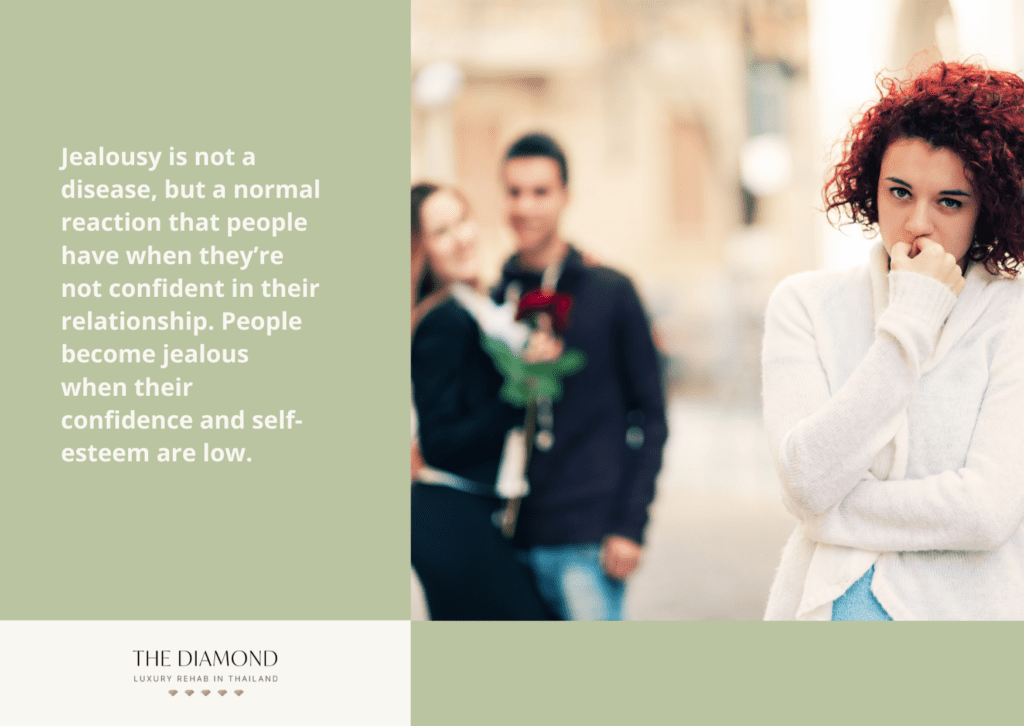
No, jealousy is not a disease, but a normal reaction that people have when they’re not confident in their relationship. People become jealous when their confidence and self-esteem are low.
Due to their negative self-image, people often believe they don’t deserve a healthy relationship and a loyal partner. Additionally, a person tends to believe they’re not attractive enough. For that reason, they often believe their partner is not in love with them. When that happens, a person becomes jealous, thinking the partner likes someone else. Men and women alike feel jealousy in relationships.
That being said, jealousy becomes a disease when people develop obsessive and pathological jealousy. It’s a disease when jealousy drives a person to become a danger to themselves and to other people.


